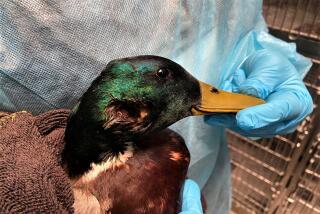HUNTINGTON BEACH : Everybody Found Issue a Bit Fuzzy
- Share via
Everything’s ducky with Sally J. Alexander, just when she feared she would run afoul of federal laws that protect migratory birds.
Alexander, 79, had provided a temporary haven in her Huntington Beach back yard for 13 mallard ducklings and their mother. She found the family waddling in the street by her house Sunday and, fearful that they would be run over or eaten by a neighbor’s cat, welcomed them to her back yard.
But on Monday, she found out her sweet deed had turned sour.
Orange County Animal Control would not take the birds off her hands. They don’t do ducks.
Further, officials told her, ducks are migratory birds protected by federal law, and she could be liable for a large fine if she picked them up and took them anywhere.
Just when Alexander feared that she couldn’t duck the daffy policy, the mother mallard flew out of her back yard late Monday and returned to lead her fuzzy little brood into a flood control channel behind the residence.
“She absolutely knew what she wanted to do,” Alexander said. “She and the babies tumbled happily down the banks into the mud and water.”
“They’re such little things, and they are so cute,” she said. “But I didn’t want to keep them. You know what they do when they grow up. They make the biggest messes.”
State and federal wildlife officials say that Alexander was not alone in her dilemma.
Increasing numbers of migratory birds find their way into swimming pools and urban lakes and ponds in Southern California as they travel the Pacific Flyway. Mallards winter as far south as Mexico and are found in the warmer months as far north as Alaska and Canada.
‘We get hundreds of calls such as this in the fall, winter and during the spring nesting period, “ said Larry Farrington, a special agent for the U.S. Fish and Wildlife Service.
Migrating birds are protected by the Migratory Bird Treaty Act with Japan, Russia, Canada, Mexico and Great Britain, he said.
It’s a crime to pick up and move a migratory bird, and violators are subject to a $500 fine or six months in jail, he said.
In Alexander’s case, the adult ducks apparently stopped their migration to mate, settling in at the home of Al and Julie Hernandez, who live across the street from Alexander and have a swimming pool.
The mother duck made her nest under a geranium plant in the back yard where the babies hatched, probably Thursday. The Hernandezes were away and didn’t see them until Sunday.
Shortly after, the ducks escaped through a side gate and wandered into the street, where Alexander found them.
If you find yourself in a conundrum like Alexander’s, Farrington recommended contacting animal rehabilitation centers that specialize in caring for wildlife that are taken in to homes.
However, Kathleen Hickman, a manager at the All Creatures Care Cottage Veterinary Hospital--one of the places cited by Farrington--said her group is overwhelmed with calls and can’t help.
Hickman said, though, that nature often solves such problems. “Once these little guys (ducklings) get larger, they’ll learn to fly and they’ll disperse,” she said.
Nature, apparently, found its own solution in Huntington Beach.
More to Read
Sign up for Essential California
The most important California stories and recommendations in your inbox every morning.
You may occasionally receive promotional content from the Los Angeles Times.













